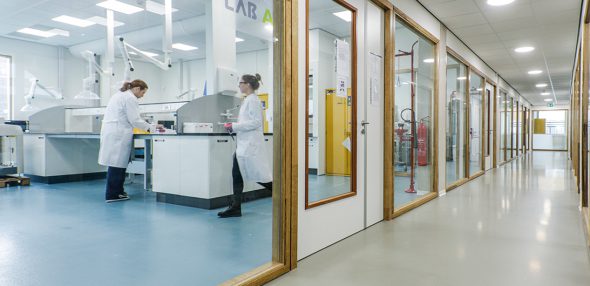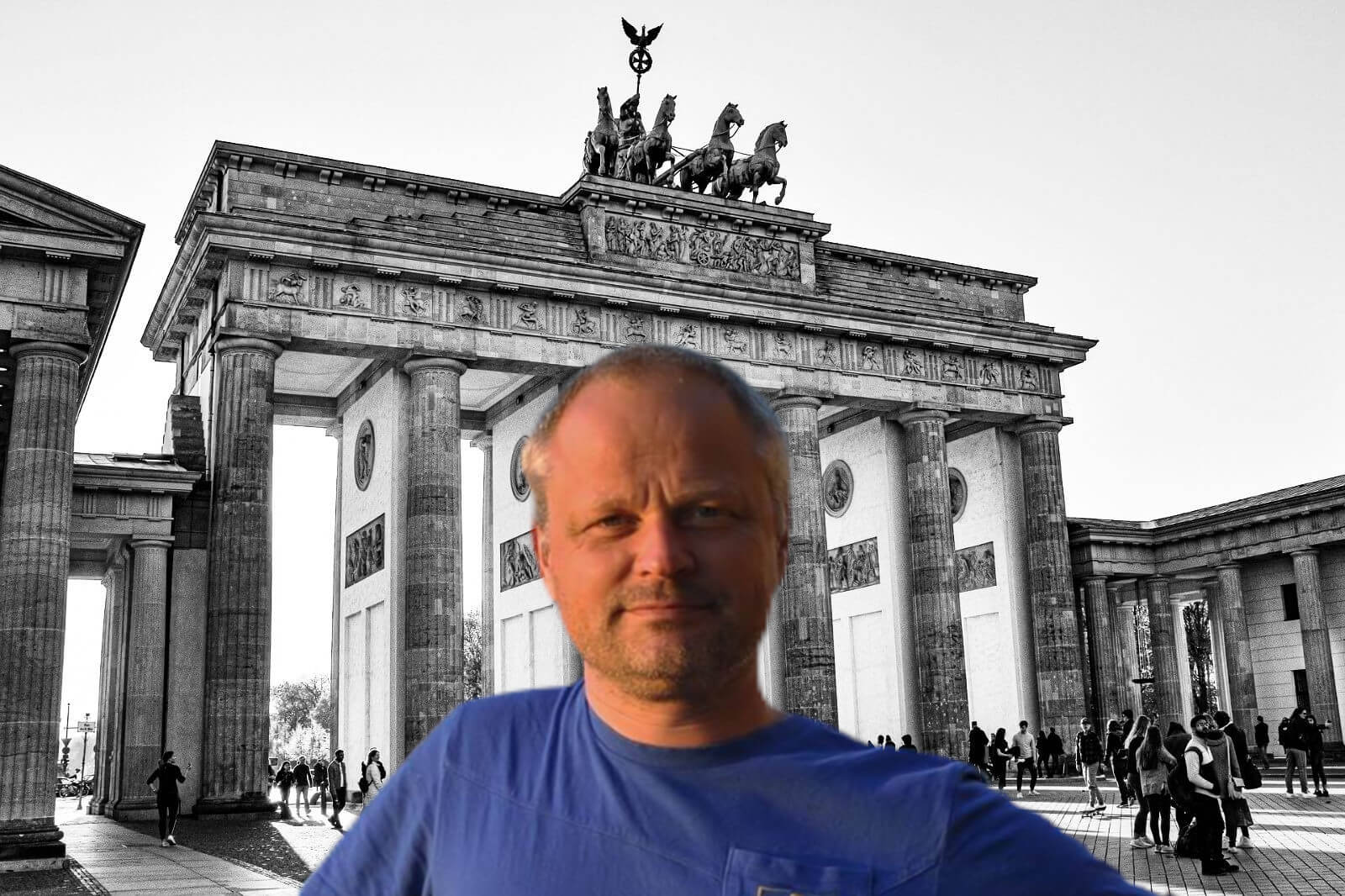
The first experiences with the Campus Community Fund (CCF) are very positive, according to the platform manager Ronald Hesse. “Since its inception September last year, sixty million euros have already been spent through the fund and several companies and projects have made use of it,” he says over the phone. “You could call it a flying start.”
Rabobank, one of the participants in the fund, is also enthusiastic. “Groningers are a modest people. As a result, we are sometimes seen a little less in Brussels and The Hague than other knowledge centers are. While we do fantastic things here that we deserve to be proud of. This fund will help to improve that,” says Peter Scheij, Director of Companies at Rabobank City and Central Groningen.
According to Hesse, the goal for this year is to raise an investment sum of 100 million euros through the fund. By 2025, that should reach half a billion euros. Part of this is intended for investment in infrastructure. Think of, for example, laboratories. Another portion of the money will go to providing financial support for start-ups and scale-ups.
More than just funding
“Seeking funding, by the way, is only a small part of what the community fund does,” says Hesse. “You have to view the CCF primarily as a platform. It is that one-stop shop where anyone can knock on the door with their project proposals and funding needs. But it is also a platform where scientists and companies can find each other to exchange innovative ideas and put them into practice.”
The idea for a Campus Community Fund was born a few years ago during a study trip to China, Peter Scheij explains. Together with a number of other people associated with the Campus, among them director Edward van der Meer, they were amazed to see innovation centers springing up there like mushrooms, with all the trimmings, from laboratories to housing and office space.

“Very impressive,” says Scheij. “It exemplified great professionalism and was inspiring for the Groningers to act with a tad more bravado as well.” Meanwhile, the Rabobank Region Eindhoven had announced in 2019 that it would make one billion euros available for funding companies and infrastructure at Brainport Eindhoven. Scheij: “The thinking at the time was that we want that too.”
Before long, a group of like-minded people then formed. This led to the establishment of the Community Fund last year, with Ronald Hesse as its manager.
How does it work?
Hesse clarifies that it is effectively about bringing supply and demand together. “For young highly innovative companies on our campus, such as SG Papertronics, QDI Systems and EV Biotech, finding funding is always a complicated ordeal. But if they also have an innovative idea or a technology that is in its infancy, it then becomes even trickier. The CCF then helps them find the right financial partners. We ensure that an entrepreneur has an overview of the available funds. These can be grants, bank loans or investments.”
An example: Suppose a company needs 10 million euros to accomplish its innovative ambitions. It first goes to a bank to see if they can extend a loan. The bank is willing, but only if, for example, the Investment and Development Company of the Northern Netherlands is also involved. If the company goes there, the answer is “yes”, but only if there are also suitable innovation schemes and public sponsoring in place.

Act as an ecosystem
Hesse: “All those different office desks that you have to pass through make it complex and time-consuming to secure your financing. The fund enables us to bring these parties together early on to jointly look at their case. By doing this, we act as an ecosystem, which collectively says yes or no to the progress of projects. This can then give an extra push to an innovative region.”
Therefore, according to Hesse, the projected 500 million euros in 2025 may in part be seen as additional money. Without the CCF, there would also have been investment, just not as much. Between 2015 and 2019, for example, it amounted to 365 million euros.
For the financiers of young companies, such as NOM and Rabobank, the fund means a pooling of strengths. Scheij: “For the record, we as Rabo are now directly involved in the fund. But if a company prefers to do business with ING or ABN Amro, we’ll have them around the table in a flash as well.”
The same goes for other stakeholders in the region, such as the city and province of Groningen, the University of Groningen, and Hanze University of Applied Sciences Groningen, the UMCG. As well as various large companies on the Campus, like the agricultural concern Avebe and Symeres from the health sector.
EV Biotech example
Linda Dijkshoorn, CEO of EV Biotech, considers the CCF to be an excellent initiative. She is one of those young entrepreneurs on campus who started her company in 2019 together with two partners. “I then took advantage of all the available financial tools in Groningen. But as a start-up, it is pretty difficult to find your way around these. Fortunately, we had help from the Venture Lab at the time. That’s an incubator where several start-ups are based – but it could have been made easier. Especially when it came to applying for subsidies.”
Dijkshoorn is nonetheless thoroughly enjoying her time in Groningen. Her company is active in the fields of bio-based economy and circular economy. The ambition of her company is to program microorganisms in such a way that they can serve as natural substitutes for, e.g., plastic materials, flavoring or fragrances.

Dijkshoorn: “Of course, there are plenty of companies working on this. But what makes our company special is that a large part of the work takes place behind the computer with models that we use to make predictions about what will happen if we make slight changes to DNA. We call that the dry lab, which is then tested in practice in the wet lab.“
The company is growing rapidly and now employs 16 people. A preliminary pilot for larger production is about to begin. This involves 15,000 liters of a particular fragrance and bioplastics.
Dijkshoorn is expecting that the CCF will mainly invest in infrastructure. According to her, this is still one of the gaps in the Groningen Campus ecosystem. There should be more room for scale-ups too. She would also be delighted if an even larger laboratory were added for companies like hers.
The Hague and Brussels
Hesse thinks that the Community Fund would be capable of meeting many of the needs of companies like EV Biotech. He also hopes that the fund will attract the attention of The Hague and Brussels, “because subsidies are important for innovative activities on a university campus.”
Hesse: “We know from experience that they often overlook Groningen in The Hague. But if we arrive in The Hague from Groningen and say that we are investing 500 million in the chemical, agrifood, digital, and the Healthy Ageing sectors, and that we are working on projects stemming from investors and private entrepreneurs, then all of a sudden, they will pay attention!”
As Hesse sees it, it is already working. For example, there has recently been a lot more attention from large real estate developers who are looking to invest specifically in Groningen.
Of the initial 60 million euros provided by the fund, one-third will go toward the construction of the Chemistry & Engineering Innovation Center on the Zernike Campus in Groningen. Scheij expects that ultimately about two-thirds of the fund’s capital will be used for private investment projects and one-third for all sorts of public facilities on the Campus. Take, for example, the entire infrastructure, buildings, laboratories, etc.
Project: Fascinating
One of the projects where the CCF provides added value is the “Fascinating” program, developed in collaboration with Campus Groningen. Agrifirm, Avebe, Cosun Beet Company and Friesland Campina are all building on a circular agricultural system with Fascinating that supports a healthy diet, is in balance with nature and delivers economic impact. It is an open test and innovation program that connects companies, the agricultural sector, knowledge institutions and the environment in order to achieve its goals.
Fascinating secured over 20 million euros in funding from its private partners and the Province of Groningen in December 2020. The program is managed by the Institute for Sustainable Process Industry (ISPT).
“This is where we gain access to high-quality expertise, talent, facilities and infrastructure. On top of that, the network enables accessible regional connections to agricultural land, pilot farms, chemical industry and large-scale industrial infrastructure that is available for biomass and renewable energy processing,” said Tjeerd Jongsma, Director ISPT. “We are looking forward to setting up innovative collaborations and facilities together with the CCF.”








